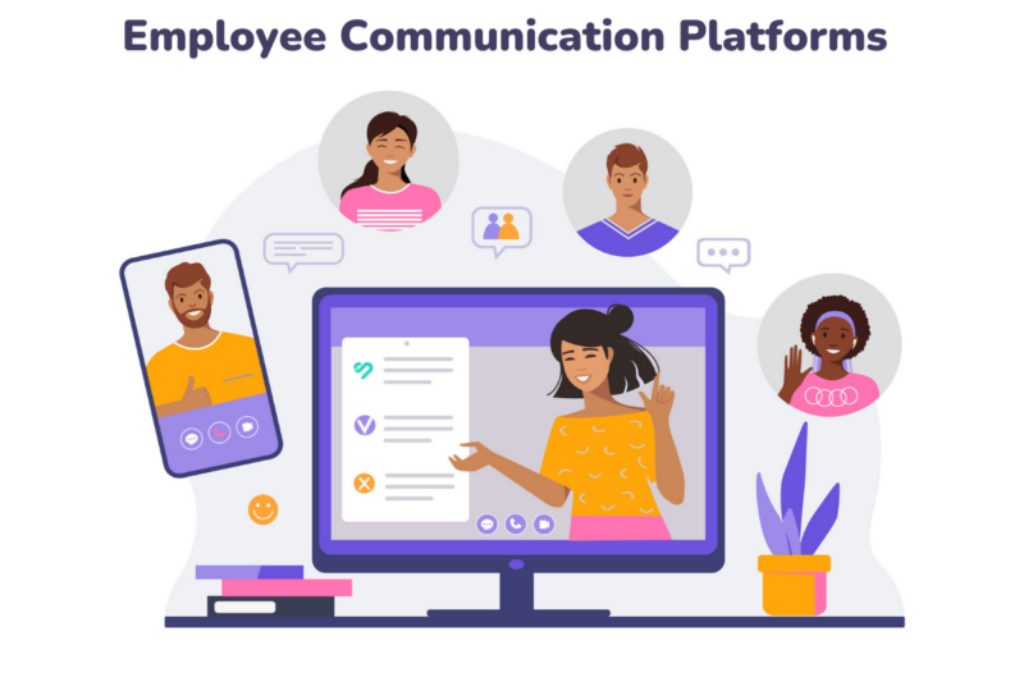
In today’s fast-paced business landscape, effective communication within an organization is essential for achieving success.
Companies from all over the world are now opting for an employee communication platform to make their internal communication procedures simpler and easier. These platforms provide a variety of advantages that improve teamwork, participation, and overall efficiency.
Good communication can promote teamwork, innovation, customer satisfaction, and business growth.
Yet, communicating can have its challenges, particularly with a widespread and varied team working remotely. How do you ensure your team is up-to-date, on the same page, and invested in your vision, values, and objectives?
One possible solution is to use an employee communication platform. This article will delve into the benefits of utilizing these apps and platforms and how they can have a positive effect on your organization.
Table of Contents
What is it, and how does it work?

Source: workvivo.com
An employee communication platform is a software tool that allows you to easily connect with your employees in a centralized, reliable, and user-friendly manner.
This can assist you in overcoming the barriers and limitations of traditional communication methods like email, phone, or face-to-face meetings. It can also improve the quality and impact of your communication by adding interactivity, personalization, and measurability.
An employee communication platform allows you to send, receive, and manage various types of communication with your employees like:
- Newsletters
- announcements
- polls
- surveys
- training
- feedback
- recognition
- quizzes
It can also allow you to create and share different types of content, like text, images, videos, audio, documents, and more as well as a lot of other features
Why use a communication platform?

Source: nextiva.com
An employee communication platform provides a wide range of advantages for both employees and employers, and even more, if the employees are working remotely.
Those benefits include better collaboration and productivity, improved engagement and satisfaction, increased learning and development opportunities, streamlined communication and feedback processes, decreased costs and risks, and improved performance and retention.
1. Centralized Communication
An employee communication platform acts as a central hub for all communication channels. From company-wide announcements to department-specific updates and individual messages, employees have easy access to everything in one place.
This simplifies how the information flows, minimizes mess, and makes sure that crucial messages are not overlooked.
2. Real-Time Updates
Old-fashioned ways of communicating, such as emails or bulletin boards, might be sluggish and ineffective. Using an employee communication platform ensures that updates are delivered instantly.
From policy changes to project updates to urgent announcements, employees are kept up to date with timely information, enabling them to stay informed and make well-informed decisions.
3. Enhanced Collaboration

Source: spiceworks.com
Working together is essential for the success of any organization. Employee communication platforms make it easy for team members to work together by offering features like instant messaging, file sharing, and project management.
Teams can work together smoothly, no matter where they are, encouraging creativity and efficiency.
4. Engagement and Employee Satisfaction
Employees who are fully committed are likely to be more efficient and dedicated. A good communication platform promotes engagement by getting employees involved in discussions, surveys, and feedback loops.
It fosters a feeling of inclusivity and encourages employees to share their thoughts and viewpoints.
5. Mobile Accessibility
Employees nowadays require access to information while on the go in our mobile-centric world. Communication platforms provide mobile applications for employees to stay connected even if they are not in the office.
Whether individuals are on the go, working from a different location, or in meetings, they can easily stay informed with important updates on their smartphones.
6. Analytics and Insights

Source: snacknation.com
It’s important to grasp communication patterns and employee engagement to enhance organizational performance.
Employee communication tools offer analytics and insights that assist HR and management in recognizing patterns, gauging engagement levels, and making informed decisions based on data.
7. Security and Privacy
Employers need to ensure that our company’s information is well-protected with strong security measures.
Employee communication platforms focus on maintaining data security to safeguard confidential information. Adding role-based access control and encryption enhances the security measures.
8. Customization
Each company has its own specific communication requirements.
Employee communication platforms offer customization options to personalize the platform according to your company’s culture, branding, and specific needs.
9. Reduced costs and risks

Source: lumapps.com
This software can assist employers in cutting down costs and minimizing risks related to communication by getting rid of costly or unreliable tools, channels, or platforms.
It can also assist employers in saving time and resources by automating and streamlining their communication processes and workflows.
It also assists in safeguarding the data and reputation by ensuring the security and privacy of their communication through tools like encryption, authentication, or compliance.
Conclusion
Simply put, using an employee communication platform provides many advantages, such as improved communication, better collaboration, and increased engagement.
As companies grow and change, it’s crucial to invest in these platforms to remain competitive and promote a positive workplace atmosphere.
FAQs
How to choose an employee communication platform?
When selecting an employee communication platform, it’s important to think about various factors like compatibility, security, scalability, user-friendliness, and support.
Here are some helpful practices and tips to guide you in making the best decision: define your goals and needs, engage your employees and stakeholders, test and evaluate various options, and provide training and monitoring for your staff.
Is an employee communication platform suitable for small businesses?
Yes! Small businesses can see a significant advantage by utilizing communication platforms. They assist in improving internal communication, boosting employee morale, and fostering a cohesive work environment.
Can an employee communication platform replace face-to-face interactions?
Even though platforms improve digital communication, in-person interactions are still important.
Utilize the platform to enhance face-to-face discussions instead of completely substituting them.
How can I measure the success of our communication platform?
Make sure to regularly review engagement metrics, survey feedback, and adoption rates. Adapt your approach according to the data for ongoing enhancement.
Are there industry-specific communication platforms?
Yes, some platforms cater to specific industries (e.g., healthcare, retail, tech). Consider your industry’s unique needs when choosing a platform.
But essentially most platforms work in the same fashion, providing a safe space with different features and integrations with the purpose of making communication, planning, execution, and monitoring easier.







